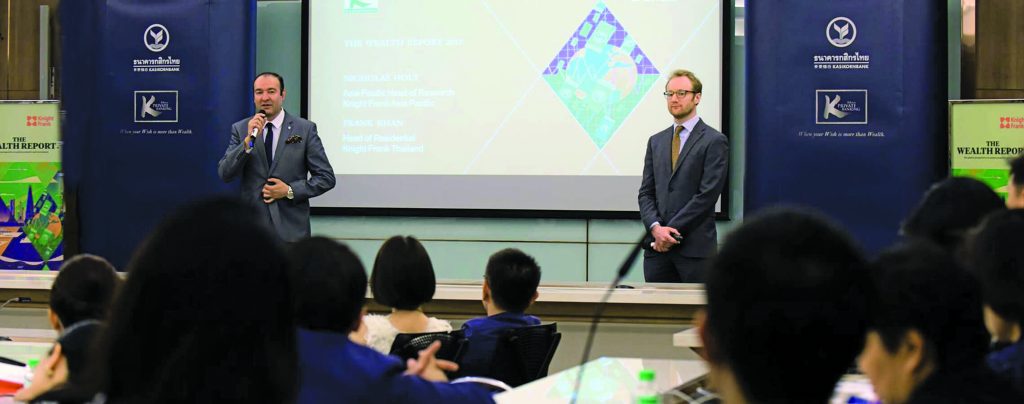Back to realty – what you need to know before you close the deal.
By Aiden Jewelle Gonzales
“Real estate is not everybody’s cup of tea; it’s hard work,” Frank Khan tells me as we sit down at the Thai head office of Knight Frank, one of the country’s leading real estate agencies, established in London 150 years ago.
As someone whose knowledge of real estate only extends to the glamourised version shown on TV and the inkling that it had a hand in the Financial crisis of 2007–2008, I found Frank’s information to be insightful, thorough and candid. When asked what his role as a real estate agent is, he answers, “The definition of an agent is that you are the bridge between the buyer and the seller. However, here at Knight Frank, we don’t call ourselves agents; we are advisors. We give transparent and full advice to both sides of the equation – to the sellers, we tell them the value of the property, where it can be sold, and when the right time to sell is; to the buyers, we give them a full evaluation of the property, its value after a certain amount of time, the rental yield, capital gains, and rental taxes. We give the whole picture and allow them to make their own decisions.”
To avoid the kind of speculative investment that led to the housing crisis, Frank tells me, knowledge of the real estate market and trust in your advisors is key. “For us, our top priority is not money; it’s to retain our clients on both sides – to gain their trust. In property, there’s nothing without trust.” Bringing to the fore his years of experience as the Executive Director and Head of Knight Frank’s Residential Department, Frank walks me through the ins and outs of the real estate industry in Thailand.
Can you give us a brief overview of the real estate industry in Thailand?
The industry in Thailand, especially in Bangkok, is a very mature industry. Our laws reflect that. For example, we have the Condominium Act, B.E. 2522 (1979) and the Land Allocation Act, B.E. 2543 (2000), and these show that this country is serious about real estate, especially because the industry accounts for up to 22-25 percent of the country’s GDP. The Thai government has even launched the Thai Investment Visa initiative in 2019, which grants foreigners who’ve invested THB 10 million or more in real estate a one-year visa, which can be renewed annually.
The big developers right now are public companies like Land and Houses Public Company, Sansiri PLC, Major Group, Ananda Development, AP Thailand PCL, and Pruksa Real Estate, which are involved in every sector of residential property development.
What is the current state of the industry, and what effect has the COVID-19 pandemic had on it?
In the last year, things changed quite dramatically. The industry was already changing in 2017-2018, in that Thai buyers and investors were drying up because they’d already invested quite a lot, and those projects were about to end. However, in those days, Chinese and Hong Kong investors immediately took over.
But when COVID-19 hit, the borders closed, so no one has been buying from abroad, and even local buyers are now more cautious. Projects in the pipeline that were going to launch in 2020 postponed their launch, and real estate development projects, both finished ones and those still being constructed, had to give massive discounts. This has attracted opportunistic investors, high- risk investors who take advantage of circumstances to buy property that they hope will have a high rate of return.
It’s been heaven for them – they’re getting finished products, at a great location, at a 30-50 percent discount; the same prices as when they were sold at pre-sales three to four years ago. We’ve seen many local opportunistic investors enter the scene last year.
How has the industry adapted over the past year, and which of these changes do you foresee will become a permanent part of industry practices?
More people have been going online – 80 percent of our buyers currently come from online platforms. However, this change has been around for years now; ever since the advent of smartphones, more and more people are buying and selling real estate online. Online information sharing won’t stop, and it’s only been accelerated over the past year. In two or three years time, I predict that our marketing will focus solely on targeted ads, digital marketing, web portals, influencers, etc., and all information sharing will be 100 percent online.
However, while Zoom meetings and webinars will continue, I predict that in- person selling will make a comeback. You can’t sell real estate on webinars – you have to be there. You also need the human touch when finding what people want. Years ago, they tried to make an A.I. sell real estate, but it didn’t work because a computer can’t read people the same way a human can.
Another big change is that people can now explore properties virtually, and influencers are visiting properties and streaming it to everyone online. Everyone’s a mini-expert now. We agents have to change ourselves and adapt to modern technology, or we’ll soon be obsolete. If we go the traditional way of an agency business, web portals will take over.
What are the emerging real estate consumer trends that you’ve noticed, especially in the wake of the pandemic?
Knight Frank conducted a customer survey of about 500 clients on their real-estate preferences post-COVID. The results reflected people’s changing priorities and behaviours because of the pandemic. For example, with people increasingly working from home, greater importance is being placed on more relaxation areas. The need for work places equipped with an internet connection, accessible ports, and adequate space, has increased by 43 percent, while 92 percent of respondents placed great importance on amenities, with a focus on nearby convenience stores, and green spaces where they can both work and relax. Preventative measures related to COVID-19, such as screening stations, ranked at 85 percent.
Moreover, fewer people are buying speculatively. 45 percent of respondents indicated they wished to buy condominiums for their own occupancy, while only 35 percent are interested in buying for investment. While 50.4 percent of buyers expressed continued interest in city-centre condominiums, 49.6 percent indicated an interest in locations further from the city, such as in Ramkhamhaeng, Tha Phra, and Bearing. This reflects their interest in bigger living spaces after the events of the last year.
You’ve mentioned that there’s been a lot of foreign investment in real estate, particularly investors from China, in the last few years. Is this good for the local industry?
For sure! Money being injected into economy is always great, and foreign investment has had a positive effect on the Thai economy and real estate. The one criticism I have is that there are a lot of agents acting on their own who negotiate a very low sale price from the developer, and then mark up the property by a lot when they go to China. This has ruined Thailand’s reputation there, all because of a few greedy individuals. But the truth will always come out. Over the lastcoupleofyears,Chinesesocialmedia has been flooded with people who foundout about the huge mark-ups and have been complaining about it online. Now the Chinese investors are very cautious, which is a shame.
Some people say that with the rapid development of real estate in recent years, it’s creating a housing bubble in Thailand. How would you respond?
I disagree. A bubble is created when prices are driven up far beyond the value of the properties, when there is a lot of speculation and unregulated credit lending, and when the supply doesn’t match demand. For example, they occur in places where you buy papers but the project turns out not to exist. However, this is unlikely to happen in Thailand. After the 1997/1998 Tom Yum Kung Financial Crisis, the Bank of Thailand and other Thai banks have become very conservative. They don’t repeat Non- Performing Loans (NPLs), which are loans that have defaulted or are close to being in default.
Loan policies of the banks have also changed – now, you can’t get a loan for real estate development unless you sell 50 percent of your property, up from 40 percent. We’ve heard that it may go up to 60 percent for new developers.
There are other cooling measures, or loan restrictions, by the government. For example, if you have a second property, you can’t get a 100 percent loan, only a 70 percent loan, so investors have to pay 30 percent out of their own pocket, which naturally limits the people who can invest. On top of that, natural cooling measures always occur, of which the COVID-19 pandemic is one.
With real estate prices at an all-time- low in Thailand, is it a good time to invest?
It’s the perfect time to invest. As an old saying goes, “when you see blood on the streets, buy real estate.” It means that when there’s a plague, or war, and people don’t have money – what do they do? They sell their assets, their real estate, and at a discounted price. That’s why opportunistic investors are buying now. It’s a buyer’s market because sellers have no choice but to sell because they need cash; cash is king when there’s no new revenue and old revenue is finished.
Bearing that in mind, what advice would you give to someone who wants to start investing in real estate?
For laymen, the three most important considerations are: the location, the product, and the price. First, look at the location – how convenient is it? By that, I don’t just mean the distance from a BTS or MRT station. How far is it from hospitals, schools, and shopping malls? When buying a condominium, you’ll also have to look at the unit location within the building. For example, which way does it face? Most Thais prefer mid- height units, so how high is it? What views does it have?
Secondly, take a look at the product itself, which has to match the location. If it’s a luxury unit, is it in a high-end location? What are the specifications and facilities, and how secure is it? Who is the market segment that the unit is aiming for?
Thirdly, the price has to match the location and the product. If these three things match and your advisor is experienced, then you have no worries. The rest is sales and marketing.
What resources can a first-time investor access to help them in their investment?
Without knowledge, don’t do anything in real estate. Knowledge is key. As for how to get that knowledge – there are many portals on the internet with information about market research and market updates. For example, our website, www.knightfrank.co.th, has a quarterly report on our market research of different property markets.
Newspapers also have a property section where professionals talk about the property market. I’d also encourage anyone starting out to find real estate advisors that they can trust and who know the market. Ask very particular questions: what they think of the product, and what market you should be targeting. These will gauge the knowledge of the agent, and if you think they have a wide breadth of knowledge, then give them your trust.
Is residential investment best for those just starting out in real estate?
If you’re just feeling out real estate, then yes, that’s the best start. I wouldn’t advise buying a factory or a warehouse and waiting for the rental on those. Start out with the smaller residential condominiums, not houses – here in Bangkok, houses aren’t for investment purposes, they’re for family living.
We categorise properties as Grade C, Grade B and B+, Grade A and A+, Luxury, and Prime, depending on the location, specifications, facilities, and product. Each category has different products, ranging from a studio or one-bedroom for Grade C properties; to two- and three-bedroom properties, with modern facilities in high-end locations, for Luxury properties. Prime properties are the branded residences: St. Regis, Sukhothai, The Residences at Sindhorn Kempinski, The Residences at Mandarin Oriental, the Four Seasons Private Residences, etc. Those sell for about THB 350k-400k per square metre.
For a first-timer, start with the Grade B residences, which will usually be a one- bedroom property, or a two-bedroom property if you can afford it. The survey we took found that condominiums not exceeding three million baht garnered the most interest at 60 percent, followed by 28 percent of respondents who were interested in condominiums worth three to five million baht.
What advice would you specifically give to those interested in buying real estate?
Get involved in the pre-sales, which is when the property is still being developed – it’s always 10-12 percent lower than the launch. Because it’s an off- plan sale, the buyer gives the developers the benefit of the doubt, so they’ll be given a lower price.
What about for those interested inselling real estate?
If you put your unit in every single agent’s website, buyers will think that there’s something wrong with your property. And if they see that you’ve been listed on a website for too long, they’ll start to wonder why.
Decide if you want to sell fast, or you want to sell slow. Do you want to sell within two years? Then you can put up the price and just wait for a buyer – there will always be a buyer, but it’ll take time. However, if you want to sell fast, put something on the market that’s very competitive. Make sure the management of the building is very good, the security is high, and all the facilities are well-managed. Put some money into the interior – make sure it stands out from other units in the same building. Be unique with your product, your agent, and your marketing.
Real estate tends to see a very pleasant net profit, which is why many people want to be involved in it, but while it’s a fruitful business, it’s not easy. In the end, my main advice is: be prepared for a lot of hard work, have big ears to listen to people, big eyes to analyse the market, common sense, and a high EQ.









